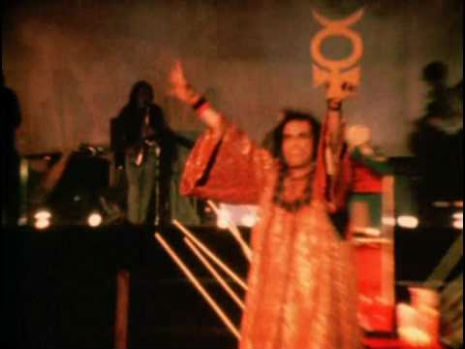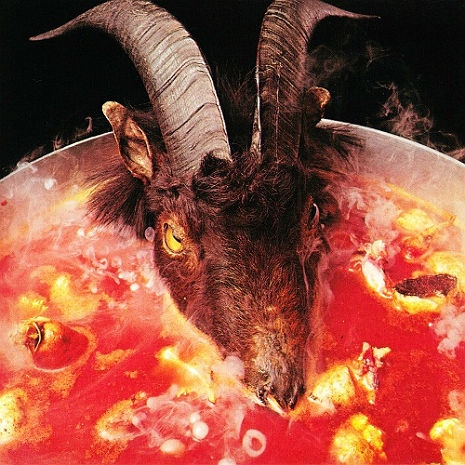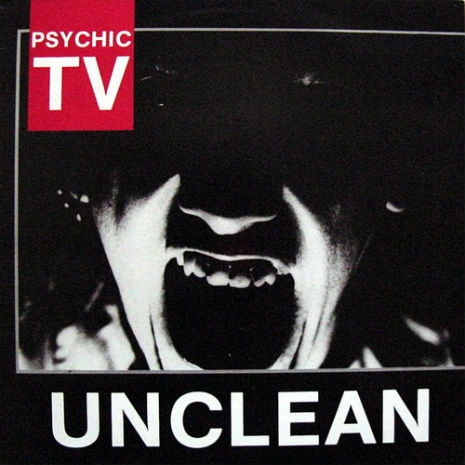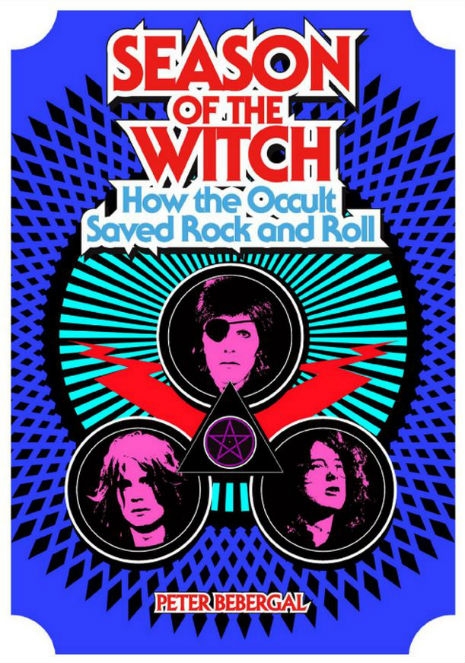Author Peter Bebergal’s new book, Season of the Witch: How the Occult Saved Rock and Roll examines a wide swath of subcultural history to explore the marriage between mysticism and music in the rock era. Covered in-depth are David Bowie, Killing Joke, King Crimson, Arthur Brown, Led Zeppelin and The Rolling Stones. And of course Aleister Crowley and underground filmmaker Kenneth Anger loom large over the proceedings. I asked the author a few questions over email.
What’s the book’s overarching thesis in a nutshell? How did the occult save rock and roll?
The essential spirit behind rock and roll, especially in the early days, is rebellion. It was a social, sexual, political, and even an artistic agitation. The book’s main claim is that at the root of this is a spiritual rebellion. Even rock’s physicality—driven by sex—was condemned as sinful, a temptation by the devil to lure kids into deviant behavior. Fears of rock were also driven by racism as the rhythms and energy of rock were—rightly—seen as coming from African American music, but was believed to be barbaric, tribal, and wickedly pagan. For musicians and fans to push forward was a deliberate, albeit often unconscious, middle-finger to mainstream ideas about what was godly. The Beat Generation, who a decade or so earlier were using art as a form of personal and social revolt, had already paved a path laden with drugs, Eastern mysticism, and occult imagery. It made perfect sense that when artists, and by extension the culture of rock, were seeking a spiritual identity to give weight to their music and meaning to their own lives, they would turn towards alternative spiritual practices.
Furthermore, there is something deeply human that what we call occult practices have given expression to. I would call this a desire for ecstasis, for having an unmediated experience with the divine. Magic and religion were once inseparable, but even when these practices were outlawed, people continued to find ways to have their own personal agency in regards to their spiritual lives. But I think we would prefer to do this in the context of community, as had once been done. This drive will always find a way to manifest, and rock and roll provided a most potent vehicle to reignite the echo of the earliest forms of worship; theater, dance, performance, shouting, drumming, and even intoxication and the shadow of madness, of being possessed by the gods.
All of these elements come together in what I define in the book as the “occult imagination,” which includes not only the way musicians and fans together created a mystique and mystery around the music, but the negative responses often found in the media and the mainstream religious communities. At the crossroads of all these things is where a potent spell has been cast over popular culture. The occult is the spiritual salvation of rock and roll, and I believe if you were to pull out this thread, popular music would sound and look very different.

How pivotal was the role Kenneth Anger played in all this? When I was a kid reading about his misadventures with the Rolling Stones and Jimmy Page, he seemed like such a far-out, fascinating and glamorous character to me. My own lifelong interest in Aleister Crowley probably starts there.
Kenneth Anger’s arrival into the midst of rock and roll culture couldn’t have been better timed. Here were young musicians like Jimmy Page and Mick Jagger, at the top of their game and feeling on top of the world, finding themselves often characterized in the media as dangerous, as bringers of chaos by way of their music and their colorful lives on and off stage. Here comes this controversial filmmaker, this “glamorous character” exactly as you say, talking about magic and how art can be a form of ritual. Anger was also older by almost twenty years, so anything he said about Crowley or the occult must have been heard as dark wisdom. Page loved this stuff, but I don’t think he ever actually practiced magic in any serious way, if at all, but Anger was the real deal. And he wasn’t a hermit. He didn’t require you to give up your fame and fortune to be initiated. In fact, for Anger, the fame and fortune were part of magic’s appeal and had the ability to transform culture through art. Jagger liked the Baudelaireian dandyism of Anger, and imagined himself the same. For Page and Jagger, Anger elevated fanciful ideas of the occult into something that could be perceived as serious and real. And their association with him, despite the various falling outs they each had with the filmmaker, only fueled the public’s speculations about Led Zeppelin and The Rolling Stones being occult devotees or even Satanists. Even though Anger was in no way a Satanist, it was during this time that the conflating of occultism and devil worship was becoming solidified. It was only deepened when Jagger would swagger like a prideful Lucifer when singing “Sympathy for the Devil.” In the end, Anger is a shadow figure that is responsible for giving both the Rolling Stones and Led Zeppelin, two of the most influential rock bands of all time, an aura of magic and mystery that would shape so much of rock’s identity and the way the media and public responded to them. In this sense, Anger’s magic was successful.

Which rockers do you find really consider themselves as occultists working in the rock idiom—occultist first, musician second—versus some who it’s all an act for them. Coil, for instance, seemed equally about the spell-casting and the music.
Coil certainly fit this definition, as well as Psychic TV, who for a time created a kind of virtual magical lodge via Thee Temple ov Psychick Youth. I think for a time Jinx Dawson saw her band Coven as being a vehicle for her occult practice, and later the band Tool integrated their own beliefs about magic into their music. But for some, while they saw their music has having potential to work magic, they still saw themselves first and foremost as musicians. Arthur Brown, best known for his song “Fire” believed a rock concert could function as a shamanic rite. He used every element of the performance, from his makeup to the staging to the way he moved, as an attempt to channel and then release what he believed was magical energy. Others would later copy his stage antics, but had no occult intentions at all, such as Alice Cooper and KISS (although they would of course be accused of being in league with infernal forces). I also think David Bowie for time believed he was working a kind of magic, but again, it was the music and the performance where it was wholly realized.

What’s the weirdest thing you uncovered when researching the book?
I was quite surprised to learn that the members of Killing Joke, following the lead of their singer Jaz Coleman, went to Iceland to await what Coleman believed was a coming apocalypse. I also learned that after Arthur Brown had disbanded his first band the Crazy World of Arthur Brown, he had a mescaline vision in which he was visited by an angel in armor, holding aloft a sword. Brown interpreted this as any real rock musician should: God was telling him to start another band. But I think the weirdest thing was how so much of rock’s association with the occult started by a simple problem of translation. In the 1840s, a young African named Samuel Ajayi Crowther from a Yoruba who had converted to Christianity wanted to start a mission back in his homeland, so he set out translating the bible into Yoruban. Of course not every word had a corresponding one in the other language, and so when he came to the issue of what to call the devil, he chose the name of his people’s trickster god, the closest the Yorubans had to a god that could not be trusted, that might tempt you. This god’s name was Eshu, and by the time the deity travelled with other converted Yorubans back to the American South, the god of the crossroads became Satan.
Below, Cerith Wyn Evans video for Psychic TV’s “Unclean”:






